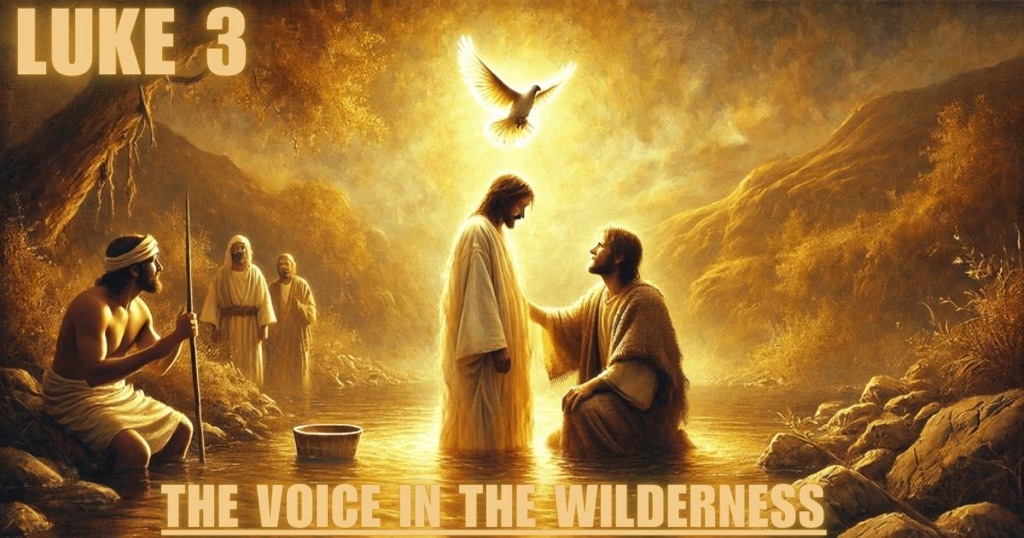In a world often marked by noise and distraction, the voice of one crying in the wilderness still echoes with powerful clarity. Luke 3 introduces us to John the Baptist—a rugged prophet with a fierce commitment to truth, justice, and preparation. But this isn’t just ancient history. His message about repentance, ethical living, and preparing for the arrival of Jesus speaks just as directly to us today. Luke’s storytelling roots this account firmly in both historical and spiritual reality, reminding us that God’s plans have always been unfolding, even in the silence.
Anchoring the Gospel in History
Luke opens chapter 3 by grounding the story in real time: the reign of Tiberius Caesar, Pontius Pilate governing Judea, Herod the Tetrarch overseeing Galilee, and high priests Annas and Caiaphas leading the religious hierarchy. These names aren’t just to give us a timeline—they help us understand the turbulent political and spiritual environment into which John begins his ministry.
Tiberius, unlike Augustus, was paranoid and often cruel. Pilate had a reputation for suppressing Jewish uprisings harshly. Even within the religious establishment, corruption and political influence had eroded trust. Against this backdrop, John’s message shines like a beacon.
John the Baptist: Prophet, Preacher, Truth Teller
John’s emergence from the wilderness is not accidental. His entire presence, from his camel-hair clothing to his diet of locusts and wild honey, recalls the prophets of old—especially Elijah. He is the first prophetic voice in over 400 years, a bridge from the Old Testament to the New. And his message is simple but profound: Repent. Prepare your hearts. The Messiah is near.
Baptism, for John, isn’t just a ritual—it’s a call to inward transformation. He preaches repentance for the forgiveness of sins, echoing the purification rites found in Judaism but infusing them with deeper meaning. The people’s response shows their hunger for change.
Ethical Living in Everyday Life
One of the most striking aspects of John’s message is its practicality. When asked, “What should we do?” he doesn’t point people toward grand religious gestures—he tells them to share clothing and food, to act honestly, and to do their jobs with integrity.
Tax collectors are told to stop exploiting others. Soldiers are instructed not to abuse their power. These instructions cut across economic and social classes and serve as a timeless reminder: repentance isn’t just about feeling sorry—it’s about changing how we live.
John’s Boldness and Humility
John doesn’t hold back. He calls the religious elite a “brood of vipers” and challenges the assumption that being descended from Abraham is enough for righteousness. “God can raise up children of Abraham from these stones,” he declares. This is a powerful challenge to spiritual complacency.
At the same time, John is clear that he is not the Messiah. While some wonder if he might be, he sets the record straight: someone greater is coming—one who will baptize not with water, but with the Holy Spirit and fire. John is the forerunner, not the focus. He points, always, to Jesus.
Jesus’ Baptism and the Affirmation of Heaven
Luke’s account of Jesus’ baptism is quiet but profound. As Jesus prays, the heavens open, the Holy Spirit descends like a dove, and a voice declares, “You are my beloved Son; with you I am well pleased.” This moment affirms Jesus’ identity and mission before He has done anything public.
It’s a striking reminder for us today: God’s love is not performance-based. Before Jesus began His ministry, before the miracles and sermons, He was already deeply loved.
The Genealogy: A Story of Everyone
Luke ends the chapter by tracing Jesus’ genealogy all the way back to Adam. This detail is significant—it shows that Jesus isn’t just the Savior of the Jewish people, but of all humanity. Unlike Matthew, who focuses on the legal royal line through Joseph, Luke may be presenting the biological line, possibly through Mary.
This diverse lineage includes kings and commoners, saints and sinners, Jews and Gentiles. It reminds us that no matter our background, we are part of the story God is writing.
Applying Luke 3 Today
So how does all this apply to us?
- Preparation matters. Just as John cleared the way for Jesus, we are called to prepare our hearts daily.
- Repentance is active. It’s not just a feeling—it’s a decision to live differently.
- Your job can be ministry. Whether you’re a soldier, a teacher, or a parent, you can live justly and serve faithfully.
- Humility paves the way for impact. John never made himself the focus; he knew his role was to point others to Jesus.
- Everyone has a place in God’s story. No background or lineage excludes someone from grace.
Conclusion: Clearing the Way for Hope
Luke 3 isn’t just a historical chapter—it’s a call to action. In the wilderness of our modern lives, we are invited to hear John’s message afresh: make the path straight, prepare the way of the Lord. Whether through simple acts of generosity, integrity at work, or pointing others to Christ with your words and life, you too can help clear the path.
John’s life is a reminder that you don’t need to be flashy to be faithful. Just be a voice that points to the One who brings real change.

